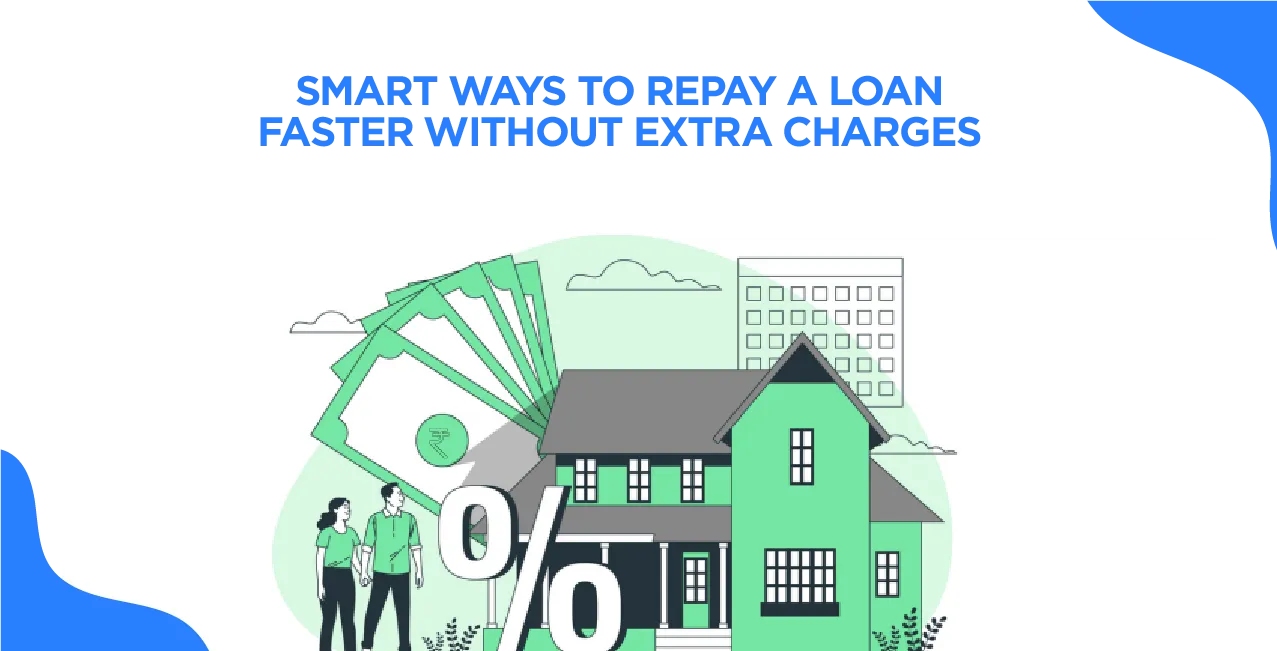Smart Ways to Repay a Loan Faster Without Extra Charges

Check Your Loan Eligibility Now
By continuing, you agree to LoansJagat's Credit Report Terms of Use, Terms and Conditions, Privacy Policy, and authorize contact via Call, SMS, Email, or WhatsApp
Are you struggling to repay your loan and wish you could pay it off faster without incurring additional charges? You’re not alone. Many people find themselves in this situation, wondering how they can accelerate their loan repayment while avoiding extra fees.
For example, let’s say you have a ₹5,00,000 personal loan with a 12% interest rate and a 5-year tenure. Your monthly EMI is ₹11,000. If you add just ₹2,000 extra every month in a year, you could reduce your loan term and save more than ₹30,000 in interest. This small change makes a big difference over time.
Repaying your loan faster not only reduces the total interest but also gives you the financial freedom to move on to your next goal sooner.
According to recent guidelines, prepayment charges can range from 2% to 5% of the outstanding loan amount.
Let's explore smart ways to speed up your loan repayment without paying extra charges or penalties. You’ll learn how small adjustments can save you big money and free you from debt faster.
Strategies to Repay Your Loan Faster
Making extra payments, paying biweekly, and rounding up your payments can help you repay loans faster, reduce interest, and shorten the loan tenure.
1. Make Extra Payments
One of the best ways to repay your loan faster is by making extra payments. Even a small extra amount each month can significantly reduce the loan term and save you interest.
For instance, if your EMI is ₹15,000, and you add ₹2,000 every month, your new monthly payment would be ₹17,000. While this doesn’t sound like a huge increase, it can reduce the loan tenure by several months and save you thousands of rupees in interest over the life of the loan.
Small extra payments not only reduce the loan balance faster but also decrease the overall interest charged because interest is calculated on the remaining principal. By reducing the principal quickly, you pay less interest in the long run.
It’s essential to have a budget that allows for these extra payments. Even ₹1,000 extra each month can bring noticeable changes over time. The consistency of making extra payments will get you closer to being debt-free sooner.
2. Round-Up Your Monthly Payments
Rounding up your monthly EMI (Equated Monthly Installment) by just ₹1,000 to ₹2,000 can help you repay your personal loan much faster. It reduces your overall loan term and lowers the interest paid over time.
Adding a small extra amount every month may seem minor, but it can save you a good amount in the long run. It also reduces the principal balance faster, which decreases the total interest charged.
Read More - Best Loan Repayment Hacks
This method is budget-friendly and ensures you’re making steady progress toward becoming debt-free without putting extra pressure on your finances.
Monthly EMI (₹) | Extra Payment (₹) | New EMI (₹) | Loan Term Reduction (Months) | Interest Saved (₹) |
10,000 | 1,000 | 11,000 | 6 | 15,000 |
10,000 | 2,000 | 12,000 | 12 | 30,000 |
Benefits:
- Faster repayment
- Less interest paid overall
- Minimal impact on your monthly budget
3. Pay Biweekly Instead of Monthly
Paying biweekly instead of monthly is another excellent way to reduce your loan term. Instead of making one full payment each month, you split the amount in half and pay every two weeks.
For example, if your EMI is ₹20,000, paying ₹10,000 every two weeks will result in 26 half-payments annually instead of the 12 full monthly payments. This method results in making one extra full payment every year, which reduces the loan term and interest.
This approach works because you end up paying more towards the principal faster, which in turn reduces the interest calculated. In the long run, paying biweekly can significantly shorten the loan duration and reduce the total interest you pay.
Over the years, this method can make a big difference in your loan balance. Not only do you pay less interest, but you also feel like the loan is gradually getting lighter, reducing financial stress.
4. Refinance to a Shorter Loan Term
Refinancing your loan to a shorter term can help you repay the loan faster without significantly increasing your monthly payment. Many lenders offer the option to refinance your loan for a shorter duration, often with similar EMIs. This option works well when you’re in a better financial position and can afford slightly higher monthly payments.
For instance, if you have a ₹5,00,000 loan with a 10-year term at 12% interest, your EMI might be ₹7,200. Refinancing the loan to a 7-year term with the same interest rate might bring your EMI to ₹8,000. While the monthly payment increases slightly, the loan term is shortened, which saves you interest in the long run.
The advantage of refinancing is that it allows you to pay off your loan faster, saving on interest, while keeping your monthly payments manageable. If you have the financial capacity, refinancing can be a powerful strategy to shorten your loan term and save money.
5. Allocate Windfalls or Bonuses Towards Loan Repayment
Using windfalls like bonuses, tax refunds, or unexpected gifts for loan repayment can help you clear your debt faster. Instead of spending this extra money on non-essential things, making a lump-sum payment directly reduces your loan amount. This lowers the interest charged in future months and shortens the loan tenure.
For example, if you receive a ₹50,000 bonus and use it to pay off a part of your ₹5,00,000 loan, your outstanding balance decreases immediately. This means you’ll pay less interest over time, making your loan easier to manage and helping you become debt-free sooner.
Benefits of Allocating Windfalls
- Reduces loan balance quickly
- Lowers total interest paid
- Shortens loan tenure
- Helps you become debt-free faster
Windfall Amount (₹) | Original Loan Amount (₹) | New Loan Balance After Payment (₹) | Interest Saved (₹) | Loan Tenure Reduced (Months) |
50,000 | 5,00,000 | 4,50,000 | 20,000 | 6 |
1,00,000 | 5,00,000 | 4,00,000 | 40,000 | 12 |
Tip: Regularly using bonuses and refunds for loan repayments can make your financial goals more achievable faster!
6. Create a Repayment Schedule and Stick to It
One of the most effective ways to repay your loan faster is by creating a structured repayment schedule. By setting clear goals and timelines for repaying your loan, you can stay motivated and focused. Break your loan repayment into smaller, achievable milestones, and track your progress.
For example, if you aim to pay off ₹50,000 in the first 6 months, ₹75,000 in the next 6 months, and so on, these targets can help you stay disciplined. Regularly reviewing your loan balance and progress toward your goal keeps you on track and helps you stay committed to the process.
Having a repayment schedule also ensures that you don’t miss any payments, which can lead to penalties or increased interest rates. It helps you maintain financial discipline and provides you with a roadmap to becoming debt-free.
How to Avoid Extra Charges While Repaying Your Loan Faster
Understand your loan agreement, prioritise high-interest loans, automate payments, and negotiate with your lender to avoid extra charges and repay your loan faster.
Understand Your Loan Agreement
Before making any extra payments or attempting to repay your loan faster, it is crucial to understand the terms and conditions of your loan agreement. Many loans have clauses that impose prepayment penalties, which could end up costing you more than you save by paying off your loan early.
Also Read - Strategies to Become Debt-Free Faster
Here's a breakdown of potential fees you might encounter:
Fee Type | Amount in ₹ | Explanation |
Prepayment Penalty | ₹5,000 | A fee is charged for paying off your loan balance early. |
Processing Fees | ₹2,000 | Charged by the lender for handling extra payments or early loan closure. |
Early Closure Charges | ₹10,000 | Fees for closing the loan before the agreed-upon term. |
Administrative Charges | ₹1,500 | Fees for updating loan documents or terms when making adjustments. |
Interest Adjustment Fee | ₹3,000 | A fee is charged to adjust interest rates if you're refinancing or making early repayments. |
This table shows various potential charges to be aware of when looking to repay your loan faster. Always read the fine print and check with your lender for any additional charges that could reduce the benefit of early repayment.
Prioritise High-Interest Loans
If you have multiple loans, it’s important to prioritise paying off the one with the highest interest rate first. By focusing on the higher-interest loan, you reduce your overall interest burden in the long term.
For example, suppose you have two loans: ₹2,00,000 at 12% interest and ₹3,00,000 at 15% interest. If you choose to pay off the ₹3,00,000 loan first, you’ll save more on interest compared to paying off the ₹2,00,000 loan with a lower interest rate.
This method is known as the debt avalanche strategy. By paying off the high-interest loan first, you reduce the amount of interest charged, which accelerates the repayment process.
As a result, you’ll become debt-free sooner and pay less in interest overall. If you consistently apply extra payments to the higher-interest loan, you'll notice your balance decreasing faster than expected, which can make a big difference in the long run.
Automate Your Loan Payments
- Avoid late fees: Setting up automatic payments ensures you never miss an EMI, thus avoiding late payment penalties.
- Timely repayments: Auto-pay helps maintain a good credit score and reduces the risk of incurring additional charges.
- Stay organised: Automating payments removes the mental load of tracking due dates and ensures timely payment every time.
Negotiate With Your Lender for Better Terms
Negotiating with your lender is a smart way to reduce your loan burden. If you have a history of making timely payments, you can request better terms like lower interest rates, reduced fees, or extended repayment periods. This can ease your financial stress and help you save money in the long run.
For example, if you have a ₹5,00,000 loan at a 15% interest rate and have been paying on time for two years, you can ask your lender for a rate reduction. If the lender agrees to lower the rate to 12%, you will save significantly on interest payments. Building a strong relationship with your lender increases your chances of getting favourable terms.
Benefits of Negotiating with Lenders
- Lower interest rates
- Reduced processing or prepayment fees
- Flexible repayment terms
- Improved chances of refinancing
Loan Amount (₹) | Initial Interest Rate (%) | Negotiated Interest Rate (%) | Annual Interest Before (₹) | Annual Interest After (₹) | Savings Per Year (₹) |
5,00,000 | 15% | 12% | 75,000 | 60,000 | 15,000 |
5,00,000 | 15% | 10% | 75,000 | 50,000 | 25,000 |
Tip: A small reduction in your interest rate can result in significant savings and help you repay your loan faster!
Conclusion
Repaying your loan faster without incurring extra charges is possible with the right approach. Take control of your loan repayment strategy today. Whether you decide to make extra payments or refinance your loan, every step you take brings you closer to financial freedom. Start reviewing your loan terms and consider these smart methods to save on interest and reduce your debt faster.
If you’re unsure about the best option for your situation, consider consulting with a financial advisor to get personalised guidance.
FAQs
1. How can I pay off my loan faster without increasing my payments?
Make extra payments, round up your payments, or pay biweekly to reduce loan tenure without extra strain.
2. Can refinancing help me pay off my loan faster?
Yes, refinancing to a shorter loan term can reduce the repayment period without significantly increasing your monthly payments.
3. Are there any penalties for paying off my loan early?
Some loans have prepayment penalties, so it's important to check the loan agreement before making extra payments.
4. How do I know if I should prioritise one loan over another?
Pay off the loan with the highest interest rate first to save on overall interest and reduce debt faster.
About the author

LoansJagat Team
Contributor‘Simplify Finance for Everyone.’ This is the common goal of our team, as we try to explain any topic with relatable examples. From personal to business finance, managing EMIs to becoming debt-free, we do extensive research on each and every parameter, so you don’t have to. Scroll up and have a look at what 15+ years of experience in the BFSI sector looks like.
Subscribe Now
Related Blog Post
Recent Blogs
All Topics
Contents
Quick Apply Loan
Consolidate your debts into one easy EMI.
Takes less than 2 minutes. No paperwork.
10 Lakhs+
Trusted Customers
2000 Cr+
Loans Disbursed
4.7/5
Google Reviews
20+
Banks & NBFCs Offers
Other services mentioned in this article








